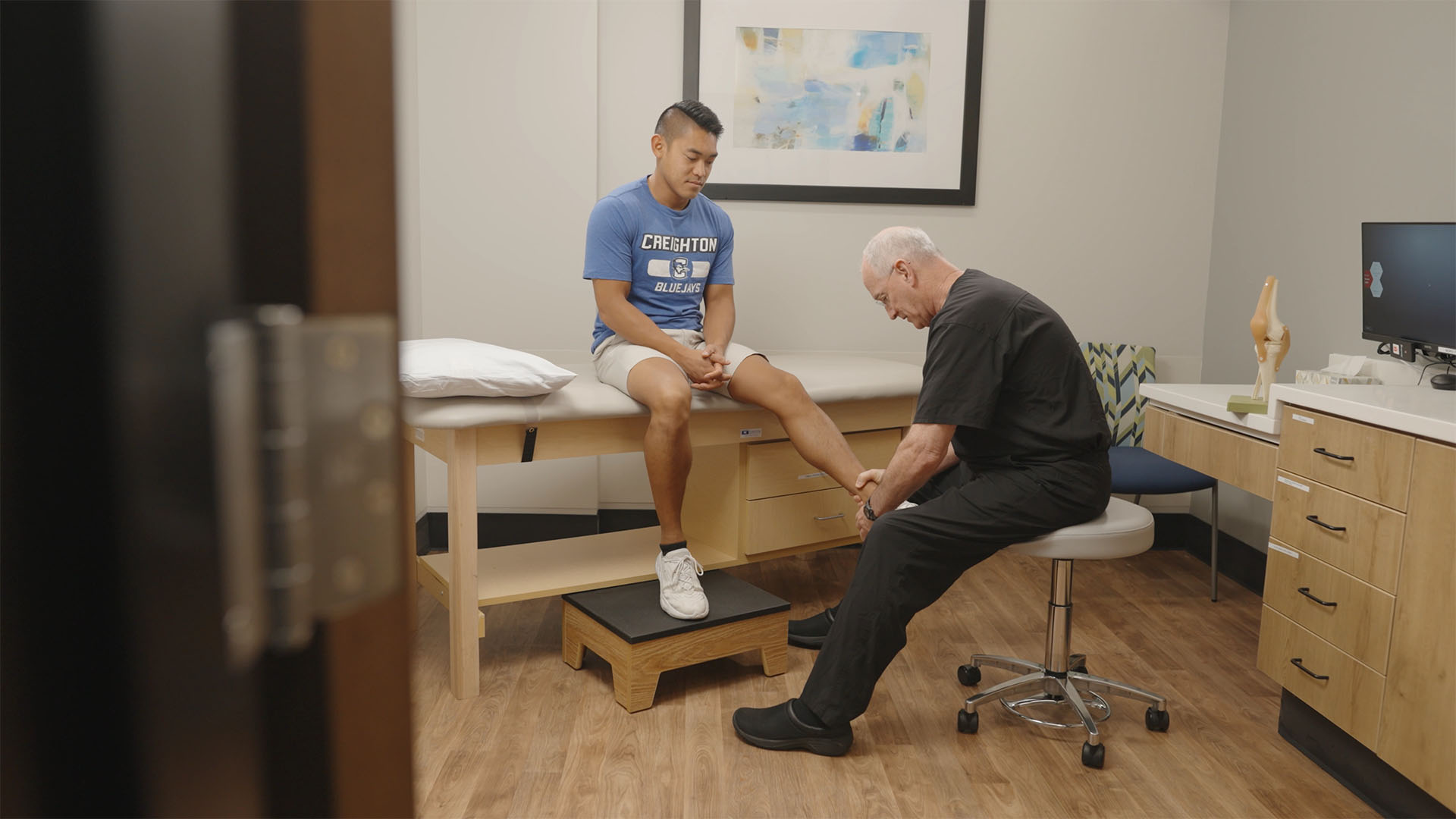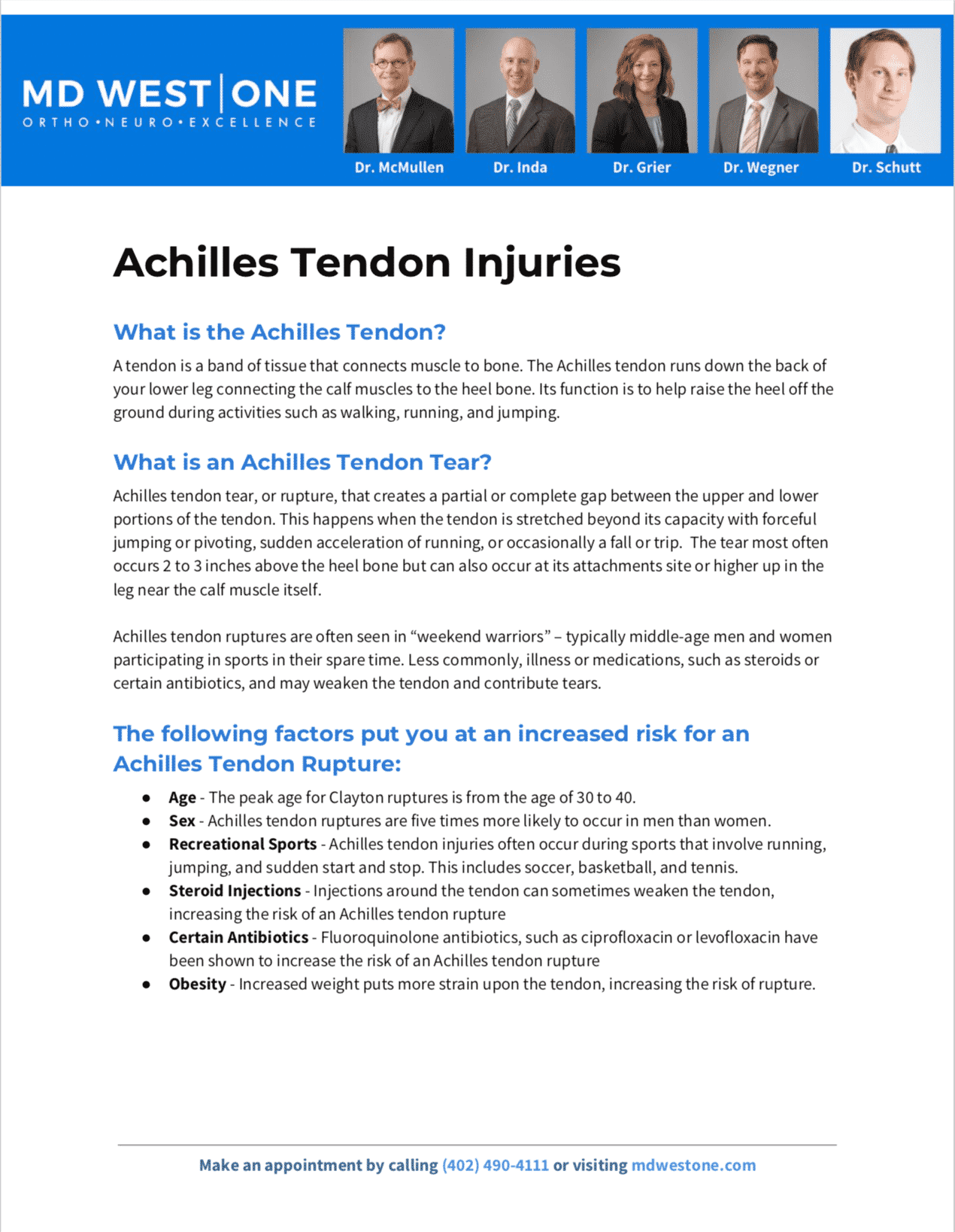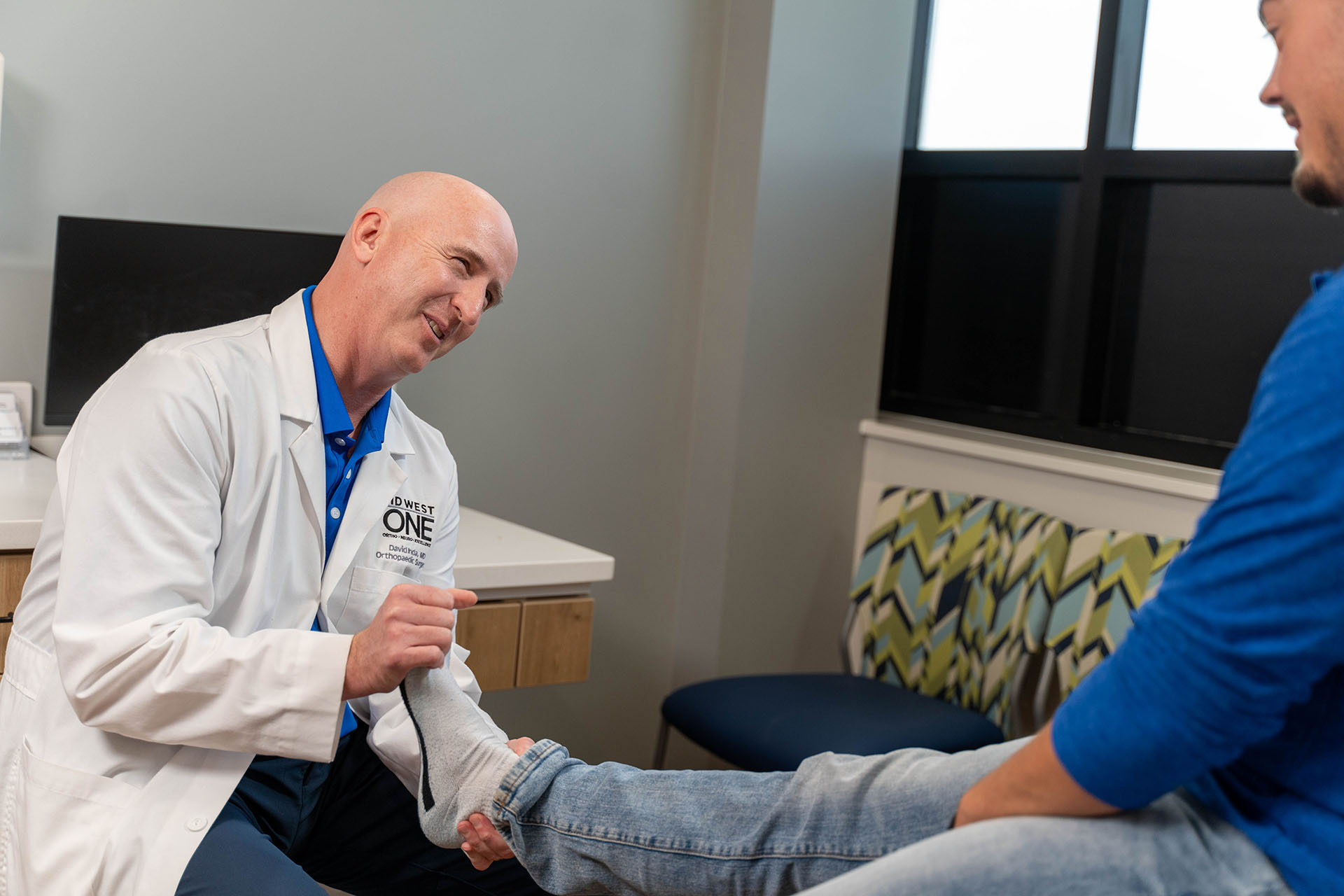Are you suffering from potential Tendon Injuries?
The Omaha Foot & Ankle Specialists at MD West ONE are able to properly diagnose and treat Tendon Injuries through both surgical and non-surgical treatments. If you have the following symptoms, you may want to make an appointment with one of our Board Certified Specialists.
- Bone spurs (small formations of extra bone near the tendon)
- Pain along the length of the tendon or where the tendon attaches to the bone
- Pain that gets worse with physical activity
- Stiffness in the tendon after periods of inactivity, such as first thing in the morning
- Swelling, redness, or warmth around the tendon
- Thickening of the tendon
Meet MD West ONE's foot and ankle specialists and learn more about how they treat Tendon Injuries.

Kathleen A. Grier, M.D.
Foot & Ankle Specialist

David J. Inda, M.D.
Foot & Ankle Specialist

Foot & Ankle Specialist

Shane Schutt, M.D.
Foot & Ankle Specialist
Tendon Injuries Causes, Treatments & Surgery
What are Tendon Injuries?
Tendon Injuries are inflammation or irritation of a tendon in your foot. Tendons are strong bands of tissue that connect muscles to bones. Overuse usually causes foot tendonitis, but it can also be the result of an injury.
The following factors put you at an increased risk for Tendon Injuries:
- Are overweight.
- Do not stretch before physical activity.
- Do not stretch after physical activity.
- Have certain health conditions, such as arthritis, gout, thyroid disease, or diabetes.
- Have flat feet.
- Have had previous tendon injuries.
- Have tight tendons and muscles in your legs.
- Smoke or use tobacco products.

Ways to Decrease Your Risk of Developing Tendon Injuries:
- Not pushing through pain. Let pain be your guide.
- Gradually working up to intense physical activity.
- Maintaining a healthy body weight.
- Not overworking your tendons.
- Not smoking or using tobacco products.
- Resting between workouts.
- Stretching before physical activity.
- Stretching after physical activity.
- Using proper technique when playing sports.
- Wearing supportive shoes that fit, including orthotics if recommended by your healthcare provider.
Download & Save
Click the button below to download the PDF version of this information. By downloading the PDF, you can easily print the resource or save it to your desktop or mobile device for future use.


Diagnosis
Your healthcare provider will perform a physical exam and review your symptoms. They may palpate (press) on certain parts of your foot, ankle, or calf. They are checking for areas of swelling and tenderness. Your provider may also ask you to perform certain movements to assess your range of motion, strength, and the severity of your pain.
If your provider suspects you may have a foot fracture or a torn tendon, they may recommend imaging exams such as an X-ray, MRI, CT scan, or ultrasound.
For many of the tendons in your foot, if not torn, an ultrasound is often the test of choice to see how the tendon moves and what types of injury or degenerative changes are causing your pain.
Non-Surgical Treatment Options
In most cases, your healthcare provider will recommend at-home treatments such as RICE to manage foot tendon pain:
- Rest: Stop physical activity to avoid further damaging the tendons in your foot.
- Ice: Put an ice pack or cold compress on your foot for up to 20 minutes at a time. Do not apply ice directly to your skin.
- Compression: Reduce swelling by applying a compression bandage or wrap around the injured tendon.
- Elevation: Lift your foot into an elevated position, preferably above the level of your heart.
Once your healthcare provider diagnoses your injury, they may recommend additional treatments such as:
- Calf stretches or exercises.
- Orthotics (special shoe inserts) to reduce pain and support your foot as you get back to physical activity.
- Non-narcotic pain relievers.
- Physical therapy to regain range of motion, strength, stability, and flexibility in your foot, ankle, and calf.
- Soft cast or boot to immobilize your foot and let the tendons heal.
Surgical Treatment Options
Most people do not need surgery for foot tendonitis. But your healthcare provider may recommend surgery if your injury has not improved after six months of nonsurgical treatments. Surgical treatments may include:
- Gastrocnemius recession: This procedure surgically lengthens your calf muscle. It may help people with flat feet or relieve stress on the Achilles tendon.
- Tenosynovectomy: This surgery debrides (cleans) a damaged tendon. A surgeon removes damaged tissue and stitches the healthy tissues back together.
- Tendon transfer: If your tendon is severely injured, you may need a tendon transfer. A surgeon removes most of the damaged tendon, then takes a healthy tendon from elsewhere in your foot and attaches it to the remaining part of the original tendon.
Frequently Asked Questions?
Achilles tendonitis is the most common type of tendon injury. Studies suggest it affects anywhere from 1% to 9% of elite and recreational athletes.
Tendon Injuries are usually chronic, meaning it develops over time when you put repeated stress on the tendons in your foot. But tendon injuries can also happen suddenly if you overstretch the tendon, over-rotate your ankle or use improper technique when running, jumping, or playing sports.
Most people recover fully from tendon injuries without any permanent damage. You can expect tendon injuries to heal with conservative treatments within a few months. If you have surgery, your recovery period could take from six to 12 months. Most people need physical therapy following surgery.
Once you have had a foot tendon injury, you are at a higher risk for future injuries in that area. Take extra measures to prevent reinjury when playing sports or exercising.
American Orthopaedic Foot & Ankle Society
All of the foot and ankle surgeons in the practice are recognized members of the American Orthopaedic Foot & Ankle Society. It is the oldest and most prestigious medical society dedicated to the foot and ankle. The mission of the society is to advance science and practice of foot and ankle surgery through education, research, and advocacy on behalf of patients and practitioners. These physicians dedicate their time and energy to improving the patient experience and their knowledge in their field. For more information visit http://www.aofas.org.
MD West ONE Foot & Ankle Specialists:
The Foot & Ankle Specialists are all Board Certified and Fellowship-Trained, meaning they’ve focused their education, training and research on orthopaedic surgery of the foot and ankle.
- Kathleen A. Grier, M.D.
- Scott T. McMullen, M.D.
- David J. Inda, M.D.
- Nicholas J. Wegner, M.D.
- Shane Schutt, M.D.
